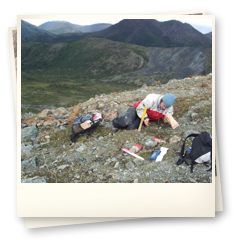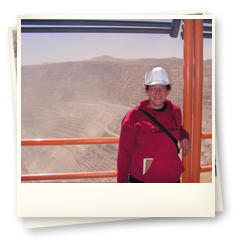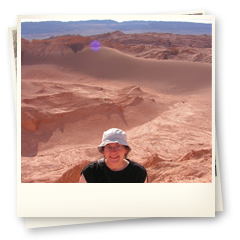
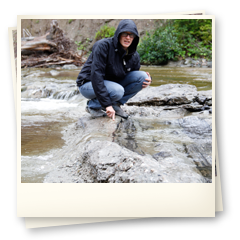
Hi! My name is Virginia Brake; I am a physical scientist with the Geological Survey of Canada in Quebec City. Hailing from the cold and rocky shores of western Newfoundland (how could I not like rocks right?), I happened upon my geologic journey by accident. After graduating from Stephenville High School, I headed off to the mainland. It was at Dalhousie University in Halifax, Nova Scotia that I learned that my interest in rocks could actually become a career. I took an introductory geology course simply to fill a science requirement and two weeks later I was wondering why I hadn’t been taking Earth Science all along. Needless to say, I was hooked and I loved the field trips that took us outside and had us see things in a new light; and not just in Nova Scotia- I also had the opportunity to participate in honours field trips in Trinidad and Chile. My first job as a junior geologist was at the Tsa de Glisza emerald project in the Yukon – a place that once seemed so far from home, I thought I would never visit.
After completing my undergraduate degree at Dalhousie, I was off to Ontario to work at a junior mining company for the summer. When the summer was over I returned to Dalhousie to pursue a master’s degree in Earth Science studying buried submarine canyons. During my degree I was co-supervised by a researcher at the Geological Survey of Canada (GSC)-Atlantic and was introduced to the GSC work environment. After completing my master’s thesis I went to work at the GSC in Quebec City. My current research focuses on the investigation of vintage and modern seismic reflection and exploration well data in the Arctic.
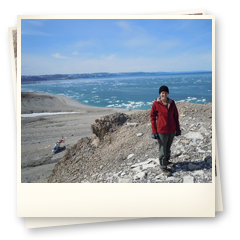
My name is Virginia Brake
I am a Geoscience Research Professional (that’s a fancy way to say physical scientist) working on energy related resource assessment projects.
I work for the Geological Survey of Canada division of Natural Resources Canada. I am currently based in Quebec City, Québec.
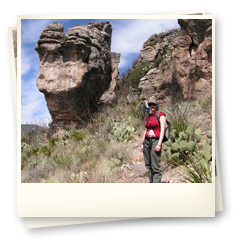
Dynamic
My typical work routine involves arriving at the office ~8 am, checking a few emails then jumping right in to exploring and interpreting my data. I usually work with Geographic Information Systems (GIS), or seismic interpretation software to investigate a combination of vintage and modern seismic reflection and well exploration data. At lunch time I head outdoors to enjoy some of the many activities that the city has to offer. After lunch, it’s back to the office to continue working on one of numerous projects in Eastern or Arctic Canada, or perhaps do a little report writing or meet with my colleagues. I usually finish up for the day around 4 pm.
My routine is largely dependant upon the demands and deliverables of whichever project I am working on. My routine also varies when I am in the field, which could mean being based in a camp in a remote location, or living on a ship for weeks at a time.
I work in an office building in downtown Quebec City.
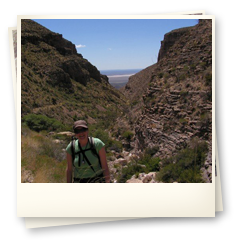
My preferred piece of equipment is my computer- it’s powerful enough to allow me to work with several programs at the same time and I have multiple screens to make things easier. I love breathing new life into vintage data using modern processing and interpretation techniques.
My position as a physical scientist requires a masters degree or higher.
There are numerous personal traits that I would recommend for this profession. Number one, you have to be curious, adventurous even, you will often ask yourself “why” something is the way it is and through the search for an answer arrive at a conclusion with multiple lines of evidence. I think determination is important too, there is often more than one way to approach a problem, so if at first you don’t succeed investigate what went wrong and why – then get back at it (being optimistic helps too!).
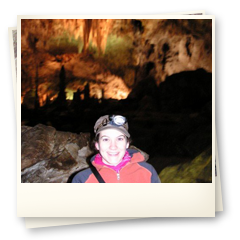
+/- $60,000
I like the freedom of my job – yes I work predominantly in my office and I am constrained by mandates and deadlines, but if I come across something interesting, or think of a new idea when going through my data, I have the opportunity to check it out and investigate further.
The primary advantage of my job is that I get to do something that is fun, and that I enjoy. Plus, I get to work with people who feel the same way and take pleasure in talking about what they do and sharing their ideas and experiences.
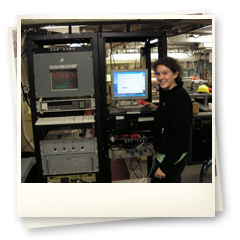
For the most part, I would not consider my job physically demanding. The exception to that would be the occasional fieldwork that sometimes demands longer hours, lots of hiking and a heavy backpack – but it can also be the best part of the job.
I chose this career because it’s something that interests me. We rely so heavily on the earth’s resources and I feel that understanding those processes and using the resources responsibly is important.
I have had so many memorable moments it’s hard to pick just one. I have fond memories of exploring caves in West Virginia, watching mud volcanoes in Trinidad, visiting the worlds larges open pit copper mine in Chile, searching for Emeralds in the Yukon and seeing plenty of sunsets at sea.
My advice to newcomers would definitely be to ask lots of questions. You don’t have to know all of the answers; don’t be afraid to pose questions to your professors, mentors, colleagues and even yourself- get as much information as you can. I would also recommend getting in the field as much as possible to look at things “in situ”.
